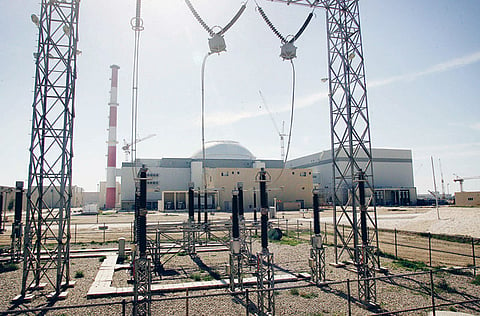Iran official concerned over fate of nuclear power plant
30,000 more centrifuges needed to enrich uranium and produce enough fuel to run the plant

Tehran: Iran’s nuclear chief has raised concerns for the fate of the country’s only running atomic power plant amid talks with the West about a final deal to curb Tehran’s controversial nuclear programme, a newspaper reported on Monday.
The government-run daily Iran quoted Ali Akbar Salehi, the Iranian negotiator in talks with six world powers, as saying that Iran needs 30,000 more centrifuges to enrich uranium and produce enough nuclear fuel to run its Bushehr power plant for a year.
World powers negotiating a final nuclear deal with Iran want a reduction — not an increase — in the number of centrifuges Tehran is operating to remove concerns that the Islamic Republic may use its enrichment capabilities to build a nuclear weapon. Centrifuges enrich uranium to produce nuclear fuel but can also be a pathway to atomic arms, depending on the level of enrichment. Iran insists its nuclear programme is for peaceful purposes only, such as generating electricity and producing radioisotopes to treat cancer patients.
The Bushehr plant, near the southern port city with the same name, was made with Russian help and has been online since 2011. Russia provides fuel for the 1,000-megawatt facility, but Iran says it wants to be self-sufficient and not remain dependent on foreign suppliers for nuclear fuel.
According to Salehi, Iran needs 50,000 centrifuges to make enough nuclear fuel for Bushehr for one year. It currently has about 20,000 centrifuges — but only around 9,000 of them are spinning and enriching uranium. If a definite deal with world powers is reached, it’s unlikely it would allow Tehran to install the additional centrifuges.
“To meet the annual fuel needs of the Bushehr plant, we must have 50,000 first generation centrifuges in order to be able to produce 30 tonnes of nuclear fuel a year,” Salehi said. He added that under a bill, the government is required to generate 20,000 megawatts of electricity from nuclear power plants in the next 15 years.
Salehi’s remarks came as Tehran and the six world powers reached the halfway mark towards an informal July deadline for a final deal meant to crimp any potential Iranian attempt to build nuclear arms in exchange for an end to crippling economic sanctions.
The talks are to continue on May 13 and the future scope of Iran’s uranium enrichment programme has remained the toughest issue. An interim nuclear deal reached in November with world powers has eased some sanctions imposed on Tehran, but the core remains in place — including measures targeting Iran’s oil exports, the pillar of its economy.
Sign up for the Daily Briefing
Get the latest news and updates straight to your inbox

